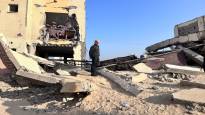Head of the Norwegian Refugee Council aid organization Jan Egeland criticizes Finland and Sweden for suspending support for UNRWA, the UN aid organization for Palestinian refugees.
– It was a hasty, political and wrong decision. I am very disappointed in Finland and Sweden, who should understand better and be principled providers of humanitarian aid, Egeland says in an interview with ‘s World Politics everyday program.
The UN’s Palestinian refugee organization UNRWA is the most significant helper of Palestinian civilians. It was caught in the eye of the storm in January. Israel claimed at the time that about a dozen of UNRWA’s roughly 13,000 employees had participated in the October terrorist attack by Hamas.
As a result, UNRWA’s largest supporter, the United States, suspended support for the organization. Fifteen other countries soon followed, including Finland and Sweden.
Egeland estimates that Finland and Sweden rushed to follow the United States in their UNRWA decision.
– The donor countries, including Finland, did everything wrong in this case. As a Norwegian, I say to you, don’t wake up every morning wondering what Washington might think. Think for yourself! Egeland bangs, from the mouth of the former diplomat quite frankly.
According to Egeland, Israel’s UNRWA accusations were political from beginning to end, and Israel has not provided any evidence for its accusations. He points out that UNRWA took action based on allegations alone. The organization launched an independent external investigation and fired the 12 employees who were the subject of accusations.
On March 22, Finland announced that it would continue to support UNRWA. Minister of Foreign Trade and Development Ville Tavio (ps.) said that enough information has been obtained from the ongoing investigations to continue the support. Sweden decided to continue supporting UNRWA a little earlier on March 9, at the same time as Canada.
Egeland is pleased with the return of Finland and Sweden to UNRWA’s supporters. From the UNRWA episode, Egeland urges us to learn from the fact that the parties to the conflict, such as Israel and Hamas, behave in a very partisan and political manner and swallow accusations from the other side.
– Such accusations should not be taken as facts, but trust in one’s own organization, the UN, of which Finland is also a member. You shouldn’t believe anything Israel says, says Egeland.
“Israel blocks humanitarian aid to Gaza”
During his diplomatic career, Egeland was one of the architects of the Oslo agreements that sought a solution to the Israeli-Palestinian conflict.
In his current position as secretary general of the Norwegian Refugee Council (NRC), he manages more than 40 aid organizations operating in the country. NRC also operates in Gaza, where Egeland himself visited at the turn of February and March.
– I hope Finland and others understand that much more help is needed. This is the bloodiest and worst bombing of the civilian population in our recent history.
According to Egeland, Israel prevents aid organizations from helping civilians. At the same time, according to Egeland, some of the most generous Western donors chose sides in freezing UNRWA’s aid.
Palestinian civilians in Gaza pay the heaviest price for the politicization of aid. Before the latest military operation, about 500 truckloads of aid reached Gaza per day, an average of about one hundred in February.
Israel is rejected the accusations of stifling aid to the borders and said he would do everything he could to help the civilians in Gaza.
Jan Egeland does not believe Israel’s words.
– It’s a lie. I have known Israel and the Palestinians for 40 years. Israel is doing everything it can to crush Hamas and won’t even let humanitarian aid in. Why are we letting Israel starve the Palestinians?
“The aid airdrops are good TV, but ineffective”
According to Egeland, the international community should take responsibility for the border crossings in Gaza. In the current situation, with Israel controlling those entering Gaza, the 2.3 million inhabitants of the strip are on the verge of starvation.
In a desperate situation, aid packages have already been dropped into Gaza from airplanes. According to Egeland, the airdrops are an indication of the inability of the US, Germany and the EU to convince Israel to open the border crossing points for humanitarian aid.
The video below shows how aid packages dropped from the air can end up in the sea:
– Airdrops look good on TV. They look dramatic and create the impression that something is being done. In reality, they are completely ineffective and end up on the strongest men, says Egeland.
Airdrops are also dangerous at worst. Since the beginning of the week, 12 people drowned in northern Gaza while searching for aid packages from the sea. In addition, six were trampled to death on the ground while collecting aid packages.
Jan Egeland was interviewed for the Everyday World Politics program, where we consider how humanitarian aid works in politicized and polarizing contemporary conflicts. You can listen to the program here:
